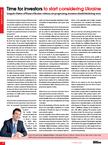Gregoire Dattee interview for BU magazine: It's time for investors to start considering Ukraine [March 2016]
Reforms are progressing, investors should think long-term
International media coverage of Ukraine tends to emphasize negative aspects such as corruption and the conflict in east Ukraine. What role do these negative perceptions play in shaping the investment climate for Ukraine and how receptive are potential investors to alternative perspectives?
Obviously, outside perceptions of Ukraine shaped by the international media tend to differ from the vision of people with closer ties to the country. To my mind, despite legitimate concerns about the geographically limited conflict in the Donbas, the rest of Ukraine is absolutely safe. I would even say Kyiv is safer than Paris in terms of personal security.
The level of corruption in the country is still too high. We count on the continuation of the reform programme outlined by the Ukrainian authorities and international donors in order to tackle this problem. However, corruption has always been an issue in Ukraine, but this has not prevented important phases of significant economic growth in the past.
In reality, businesses already present in Ukraine are not leaving the market. Moreover, we see many foreign companies established in Ukraine developing new investments or planning new investments in the near future. On the other hand, I heard last week of a French businessman who refused to consider a project in Ukraine because he does not dare to come to Kyiv. In order to get a more realistic picture of this market and its opportunities, you really need to come to Ukraine and see for yourself.
You work with a number of long-term investors in Ukraine. In your experience, what characteristics do successful international investment projects in Ukraine tend to share?
No matter where you are investing, the formula for success is always a matter of subtle alchemy. However, in Ukraine I would highlight three unavoidable points: investment in people, adaptation to the local specifics of doing business, and a great sense of ethics.
Beyond the financial part of any investment project, the importance of time invested by key people can easily be underestimated. The cultures at work in Ukraine, as well as the financial culture, are markedly different from those in many Western countries. Investing time and energy is important in order to have closer ties between the investor group and its Ukrainian activity via a significant presence of expatriates or a strong investment in local management with former experience within the group.
The process of adapting to local specifics can occur on two levels. It can mean adaptation to a fast-changing environment where pragmatism and quick decision-making processes are of great value. It can also mean adaptation to the ways of doing business – the importance of individual relationships and management style.
Great business ethics are crucial because solicitations can be numerous. This usually implies ‘resisting’ administrative organs that in many cases still put significant pressure on businesses. There is now much more support in this regard following the recent creation of two dedicated bodies, the National Anticorruption Bureau and the Business Ombudsman Office. There must be no compromises in regards to ethics.
What do you see as the most attractive investment opportunities in today’s Ukraine?
Firstly, it is important to note that the Ukrainian market benefits from a very well educated labour force with a great sense of adaptation and strong work ethic.
Due to the devaluation of the hryvnia, this workforce is now also highly competitive. As a result, producing in Ukraine for export is becoming a more attractive option.
In terms of specific sectors of the economy, there are a number of particularly attractive industries. Ukrainian agriculture has already attracted numerous major French investments. The IT industry is booming thanks to the country’s vast and highly skilled technology workforce. Energy and energy efficiency are exciting areas where much modernization work is required. Light industry is also appealing due to highly competitive production costs combined with Ukraine’s strategic geographical location, enabling cheaper and quicker deliveries.
What are the key risks facing potential investors considering Ukraine market entry?
Ukraine presents the usual risks that foreign investors face in all emerging markets. Top of the list is the absence of political stability. The economic situation has stabilized impressively over the past eighteen months, but economic fundamentals must still be confirmed and strengthened. Like many emerging markets, Ukraine suffers from a weak judicial system resulting in high levels of corruption.
There are a number of factors more specific to Ukraine, including, for the moment, an absence of developed hedging tools, in particular in regards to foreign exchange risks. Solutions exist. However, this point must be considered from the very beginning. It is also worth noting that notions of investment timeframe may differ in Ukraine – there are exceptions, but in most of the cases, investments should probably be viewed in the context of a mid- to long-term timeframe.
What do you regard as the most important reforms implemented since the 2013-14 Euromaidan Revolution?
As I mentioned earlier in this interview, international media coverage tends to emphasize negative points quicker than positive aspects. However, many important reforms have already been implemented. In other cases, the implementation process is at an advanced stage. This progress has already had a noticeable impact on the daily life of businesses in Ukraine. For example, there has been a significant cleanup of the banking system, with efforts ongoing. The taxation system has been revised. Tax rates are now competitive (Corporate Income Tax at 18%, VAT standard rate at 20%, Personal Income Tax at 18% single rate). Ukraine’s main tax rules now tend to converge with European standards. The situation regarding VAT credit has also improved significantly. Labour costs have decreased too, with a single social contribution rate fixed at 22%, instead of an average rate of 41% previously.
The article is available to download

